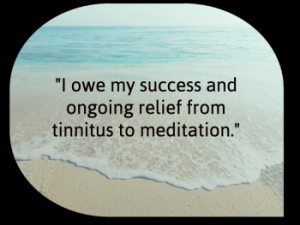|
www.HealthyHearing.com |
Using meditation for tinnitus - my success storyWhen done correctly, meditation can be a powerful habituation tool
Contributed by Glenn Schweitzer When I was first diagnosed with tinnitus and Meniere’s disease, I thought my life was over. 
A mountain of pain and suffering stood before me and I could see nothing else. My ears screamed all the time and the spikes were unbearable. I was dizzy, struggling with hearing loss, intermittently incapacitated by vertigo attacks where the room would start spinning, and exhausted by brain fog and fatigue from the moment I woke up until the time I went to sleep. There was no light at the end of the tunnel. I had no hope. It’s hard to think back on this time of my life, knowing how long the 24-year-old me would have to suffer before anything changed. Because there was hope, I just didn’t know it at the time. Fast forward and today my life looks very different. My Meniere’s symptoms are not cured, but effectively managed on an ongoing basis and I’ve completely habituated to the ringing in my ears. It’s not gone, but it stopped bothering me entirely. About 98% of the time, my brain just tunes it out. I live a wonderful life now and in a lot of ways I owe my success and ongoing relief from tinnitus to meditation. It changed everything for me. And if you are suffering from tinnitus, I believe it could possibly change everything for you too. What is meditation?Before I go any further, I need to explain a couple of things about meditation. There are a lot of different styles of meditation, each involving a different approach, technique, or method, and with varying results. But generally speaking, meditation is a mental exercise that involves concentrating your attention onto a single point of focus, like your breathing, a mantra, or a part of your body, for an extended period of time. It’s a lot harder to do than it sounds because your mind will wander constantly. Most of us are entirely unaware of this inner dialogue, but at any given moment, we are usually lost in thought. Our minds chatter away endlessly with self-talk, ideas, images, and reminders. And when we try to focus away from these thoughts during meditation, we succeed only momentarily – at least at first. So when your mind wanders during meditation and you start thinking about something else, which is inevitable, you catch yourself, gently bring your focus back, and start again. The point of meditation is not to keep a perfectly clear and focused mind – this is extraordinarily difficult even for experienced meditators. The point is to catch yourself when your mind is wandering and begin again. Catching yourself and starting over is the exercise. Why meditate in the first place?The benefits of practicing meditation can be profound when you practice every day. In the short term, you can experience a deep sense of calm and relaxation. When you are focused on a single point of awareness, like your breathing, you aren’t worried about an argument you had with your friend last week or some approaching deadline at work. You become entirely immersed in the present moment – everything else falls away – and your body, brain, and nervous system can fully relax.
The long-term effects are even more beneficial. Stress levels decrease and the ability to cope with stress in the moment is greatly enhanced. Focus and concentration improve dramatically. During acute stress, you can center and calm yourself much more quickly. You start to react less and respond more. The ability to quiet the mind also allows you to fall asleep faster and more easily. At its best, meditation can be an intensely pleasurable experience. Relaxation and inner peace may not necessarily be the end goal of meditation, but it’s this aspect of the practice that can set you on a path that ends in lasting relief from tinnitus. Meditation with tinnitus is hard but not impossibleWhen my tinnitus and Meniere’s disease were at their worst, my quality of life was in shambles and there were a lot of things I thought I would never be able to do again. Meditation was at the top of the list. I had been meditating daily for several years when chronic illness tore through my life. It had been a transformational practice, helping me to finally get my anxiety under control after more than a decade of panic attacks and generalized nervousness.
But as my tinnitus worsened, it became impossible to meditate. I just couldn’t focus anymore with the sound of sirens blasting in my ears and it was devastating. I had lost not just my quality of life, but one of the most powerful coping tools that I had relied on for years to maintain my wellbeing. Luckily, I never gave up or stopped trying to make it work. And my persistence eventually paid off. One night, lying in bed, once again struggling to meditate, I suddenly had an idea: What would happen if I stopped fighting to ignore the ringing while I tried to focus on my breath, and focused on the sound of my tinnitus instead? At first, it seemed like such a crazy idea to focus on the sound that was driving me crazy. But I was frustrated, and I was willing to do anything at that point to try to fix the problem, so I gave it a shot. And the 15 minutes that followed changed everything. 'I didn't hear my tinnitus at all'
As I hesitantly shifted my focus to the sound of my tinnitus, the first thing I noticed was that it was difficult to do, but not for the reasons you would expect. Meditation is a simple exercise, but difficult in practice, because it’s hard to stay that focused on anything, regardless of what you choose as the specific object of your attention – even something as intrusive as tinnitus. So my mind wandered almost immediately. For a few minutes, I was entirely lost in thought – daydreaming about nothing in particular – when I suddenly caught myself and brought my attention back to the sound. But this time, it suddenly occurred to me that when my mind wandered, it wandered away from the sound. The realization hit me like a lightning bolt. I couldn’t believe what had just happened. For those last few minutes, lost in thought, I didn’t hear my tinnitus at all. As I went back to the practice, I also found that I was able to fully concentrate for the first time since my tinnitus began. Once I stopped fighting to ignore the sound, I was able stay focused long enough to achieve the familiar state of relaxation and calm that had escaped me for months. And when I finished, the ringing didn’t seem as loud. It wasn’t actually quieter, it just wasn’t bothering me as much, so it seemed quieter and less intrusive. I was just so happy to have any relief at all. Tinnitus habituationOf course, my tinnitus didn’t magically go away after one successful meditation. It started bothering me again within a few hours. But I felt like I had finally found some measure of control, and as the weeks went on, my tinnitus slowly started to improve. What I know now that I didn’t know then is that practicing tinnitus-focused meditation was helping me to habituate to the sound.
Habituation is a mental process in which the brain filters out and ignores repetitive sensory information. Usually, it happens automatically, all the time, and without conscious effort of any kind. It’s why we normally don’t feel our clothes against our skin or our socks against our feet. And why we stop noticing the smell of a stinky room after a period of time. Habituation also applies to the way we perceive sound. It’s the reason most people can be productive in noisy office environments, and how we are able to hear friends and family speak over the other people talking all around us in loud restaurants. It gives our brain the ability to tune out sounds that don’t matter so we can focus on the ones that do. And the good news is that it is entirely possible to habituate to the sound of your tinnitus. In practical terms, this means getting to a place where your tinnitus no longer bothers you at all, where your brain just ignores it and tunes it out, more and more of the time. The problem is that when ringing in the ears is bothersome, there are two major obstacles that prevent this from happening naturally. Removing the obstacles with meditationThe first obstacle preventing tinnitus habituation is that we evolved to use sound to monitor our surroundings for threats and experience a fight or flight stress response to any sound we interpret as dangerous. 
can help ease the burden of tinnitus. The second problem is that the brain often can’t tell the difference between real and imagined danger. Public speaking is another good example of this. There is nothing dangerous about public speaking, yet many of us experience a panicky fight or flight kind of feeling in front of an audience. Fear is the underlying factor here. When we are afraid, our brain and nervous system react as if the danger is real, whether it’s real or not. So we get stuck in a vicious cycle of fight or flight that never ends because the tinnitus never goes away. Instead, the resulting anxiety, frustration, fear, anger, and depression snowball into the reaction, becoming a part of the reaction. This prevents our brain from habituating to the sound. It’s simply impossible to ignore a sound that the brain interprets as danger. But you can change your reaction to the sound. And when you do, there is nothing preventing you from tuning out the sound of your tinnitus exactly like you do with all other meaningless sounds. What I discovered – entirely by accident – was that by focusing on the sound of my tinnitus during meditation, my brain was starting to associate the very positive experience of relaxation and calm with the ringing. And this new association slowly began to overpower the old association with suffering. Over time, the fear response diminished, and I found myself ignoring the sound more and more of time. More: Apps for tinnitus The basic tinnitus meditation techniqueI want to be very clear that meditation is not the be all end all when it comes to coping with tinnitus. When working to habituate, there are a lot of helpful things you can do to improve quality of life. But for me, it was the most important piece of the puzzle. So if you want to give this a try, here is the basic tinnitus focused meditation technique, copied verbatim from my book Rewiring Tinnitus: How I Finally Found Relief From the Ringing in My Ears. Close your eyes and take five deep breaths into your diaphragm (lower abdomen). Feel your stomach expand as you inhale, and with each exhale, feel your entire body become more and more relaxed, letting all of your muscles go completely limp like a ragdoll. Next, focus on relaxing individual muscle groups, one at a time, relaxing each as much as possible before moving on. Let all of the tension go as you work your way through your body. Start by focusing on your feet and your toes. Allow the muscles to go completely limp. Now focus on your legs and your butt, releasing all the tension. Continue on to your stomach and your lower back, then your chest and upper back, your shoulders and your arms, your hands and your fingers, your neck and your throat, and finally, your head and your face. Once you’ve worked your way through your body, and your muscles are completely relaxed, take another five deep breaths into your diaphragm. Once your body is completely relaxed, it’s time to focus your attention on the sound of your tinnitus. Try to maintain a mindset of curiosity, as if you were observing something interesting for the first time. Continue to breathe naturally and keep your mind focused on the sound. When your mind starts to wander, and you notice it happening, gently bring your focus back to the sound. Making it easierAt this point, you might be thinking there is no possible way I can do this. I completely understand. I was a seasoned meditator with years of experience when I first thought to try this, and it still terrified me. Meditation is hard to learn even without tinnitus. So here are several helpful strategies to make it easier:
I know I’m not the first person to discover the link between tinnitus, meditation, and habituation. Mediation and mindfulness have earned a much more prominent position in tinnitus management over the past few years. But I’ve made it my life’s work to spread this message of hope, because tinnitus-focused meditation enabled me to fully habituate and find lasting relief from the sound that drove me absolutely crazy for a long time. There may not yet be a cure for tinnitus, but with habituation, there is a path out of the suffering. And meditation isn’t the only way, just one powerful path among others that all end in a similar place of peace of mind and quality of life. And that’s what matters most. Many people, for example find relief via cognitive behavioral therapy for tinnitus. Tackling Tinnitus: Read more of Glenn Schweitzer's columns Note: If you're experiencing suicidal thoughts, please read Tinnitus and suicidal thoughts: What to do when life feels overwhelming. Glenn Schweitzer
Related Help Pages:
Tinnitus (ringing in the ears) Symptoms Causes Treatment Meniere's disease BPPV Dizziness
|
Featured clinics near me
Earzlink Hearing Care - Reynoldsburg
7668 Slate Ridge Blvd
Reynoldsburg, OH 43068

Find a clinic
Need a hearing test but not sure which clinic to choose?
Call 1-877-872-7165 for help setting up a hearing test appointment.


 Glenn Schweitzer is an entrepreneur, blogger, and the author of Rewiring Tinnitus and Mind over Meniere’s. He is passionate about helping others who suffer from tinnitus and vestibular disorders and volunteers as an Ambassador Board Member for the Vestibular Disorders Association (VEDA). Through his blogs, he continues to raise awareness for tinnitus, Meniere’s disease, and other vestibular disorders, spreading his message of hope to those in need.
Glenn Schweitzer is an entrepreneur, blogger, and the author of Rewiring Tinnitus and Mind over Meniere’s. He is passionate about helping others who suffer from tinnitus and vestibular disorders and volunteers as an Ambassador Board Member for the Vestibular Disorders Association (VEDA). Through his blogs, he continues to raise awareness for tinnitus, Meniere’s disease, and other vestibular disorders, spreading his message of hope to those in need.